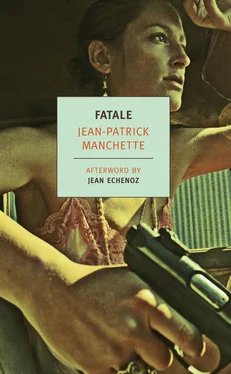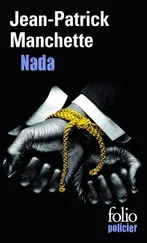Jean-Patrick Manchette - Fatale
Здесь есть возможность читать онлайн «Jean-Patrick Manchette - Fatale» весь текст электронной книги совершенно бесплатно (целиком полную версию без сокращений). В некоторых случаях можно слушать аудио, скачать через торрент в формате fb2 и присутствует краткое содержание. Год выпуска: 2011, ISBN: 2011, Издательство: New York Review Books, Жанр: Криминальный детектив, на английском языке. Описание произведения, (предисловие) а так же отзывы посетителей доступны на портале библиотеки ЛибКат.
- Название:Fatale
- Автор:
- Издательство:New York Review Books
- Жанр:
- Год:2011
- ISBN:978-1-59017-572-9
- Рейтинг книги:5 / 5. Голосов: 1
-
Избранное:Добавить в избранное
- Отзывы:
-
Ваша оценка:
- 100
- 1
- 2
- 3
- 4
- 5
Fatale: краткое содержание, описание и аннотация
Предлагаем к чтению аннотацию, описание, краткое содержание или предисловие (зависит от того, что написал сам автор книги «Fatale»). Если вы не нашли необходимую информацию о книге — напишите в комментариях, мы постараемся отыскать её.
Fatale — читать онлайн бесплатно полную книгу (весь текст) целиком
Ниже представлен текст книги, разбитый по страницам. Система сохранения места последней прочитанной страницы, позволяет с удобством читать онлайн бесплатно книгу «Fatale», без необходимости каждый раз заново искать на чём Вы остановились. Поставьте закладку, и сможете в любой момент перейти на страницу, на которой закончили чтение.
Интервал:
Закладка:
“I am not involved in all this,” said Sonia. “I am merely trying-” She broke off. “No one can stop me from sticking with my husband.”
“Of course, of course. Good for you. Bravo,” said Aimée as she straddled her bicycle. “You can all stick with your husbands. Stupid cows.”
She rode away on the Raleigh, pedaling vigorously. Whichever way you go, there is a big hill to climb before you get out of Bléville. Aimée headed east, inland. She climbed the entire hillside standing. By the time she reached the top of the hill, she was panting, her forehead was running with sweat, and her armpits smelled rank. Sitting back down on the saddle, she raced along the even road. Her teeth were bared; she was excited. In a few minutes she reached the hamlet where Baron Jules lived. The baron invited her in. He was wearing blue jeans and a check cotton shirt frayed and fluffy at the collar and cuffs, along with a velvet jacket. Aimée told him what had been happening. She described the scene at the Moutets. The baron asked her why she had come straight to him to retail all this.
“I thought it would amuse you,” she answered.
“You certainly thought no such thing!” scolded the baron with irritation. The approach of nightfall made it very dark in the cluttered living room. The nobleman switched on a lamp with a shade and stared suspiciously at Aimée, who had sat down in an armchair with broken springs. “Think how long I have been observing those people, my God! I have been observing them for thirty years and more, it must be nearly forty now, yes indeed! Well, in all that time they have not given me a single moment’s amusement. They make me want to vomit and destroy them.”
“Yes,” said Aimée, “precisely. But I’ll believe it when I see it.” She shook her head violently, as though to get her thoughts straight or shake off an unpleasant memory. She had the blank look of someone suddenly unable to see the necessity of what they have decided to do. But she quickly collected herself. “Yes, yes, yes, precisely,” she repeated, nodding and leaning forward excitedly. “Moutet is going to fight this. He needs weapons to do it-and allies. I daresay someone like Dr. Sinistrat will line up with him. And then there’s this guy DiBona, from the Dépêche de Bléville , I think-yes, that’s it. If they dig up stuff against Lorque and Lenverguez, there’ll be havoc.”
“Why should I give a shit?” demanded Baron Jules.
“The dirt-you’ve got to have it, considering all the time you’ve been observing Bléville,” said Aimée. “If you really want to vomit and destroy them, this is your moment.”
The baron gazed at her for a moment, then burst out laughing. His laugh was painful to him. It literally doubled him up.
“You’re insane,” he said, with tears in his eyes.
“I’ve said what I had to say,” replied Aimée tranquilly. She got out of the armchair with the broken springs and made for the door with her hands thrust into her pockets.
“Wait!” cried the baron, plunging after her. “You are a terrifyingly negative and beautiful person.” He tripped over one of the filthy rugs and fell to one knee. “Listen up!” he said. “Just what is your interest in all this?”
Aimée was already through the hall and out the front door. She ran down the steps, mounted her bicycle, and set the dynamo for light, for night had fallen. Puffing, the baron emerged at the top of the darkened front steps. He was rubbing his knee.
“Wait, for God’s sake!” he cried. “What is your interest in this, for God’s sake? Don’t leave. Explain!”
But Aimée, her tires creating a crackle and spray of gravel, was heading full-tilt for the gate, then she was through it and gone.
11
That same evening, as he returned home a few minutes before midnight, the journalist DiBona found Baron Jules waiting for him on the stairs of his apartment building. As DiBona told it the next day, he had the impression at the moment that the man was drunk, although you never really knew with the baron. What is certain is that the impecunious nobleman was highly excited and vexed. DiBona invited him into his apartment and they had a conversation. (At some point during their exchange, DiBona telephoned the Dépêche ’s printshop; and later that night, after the conversation was over, he left his home once more and went to reset the entire front page of the next day’s paper and made some changes to the inside pages.) As the two men were talking the baron drank a great deal of red wine that DiBona poured for him and repeatedly buried his face in his hands, pressing his palms hard against the area just below his eyes, then abruptly moving them downwards, still applying pressure, as though seeking to wipe away deep stains, or perhaps tattoos, from his cheeks. He was also continually rising from his chair and then sitting down again. He paced back and forth across the dull parquet floor. At times he was voluble, at others information had to be dragged out of him. Throughout the interview he displayed a quite remarkable animosity towards DiBona, for after all the baron had come of his own accord, no one had forced him and nothing obliged him to reveal things to the reporter or to talk to him as he chose to do.
For example, after evoking Bléville’s past in a vague and abstract manner, and after DiBona asked him what was so special about that past, Baron Jules well-nigh shouted.
“Nothing! Nothing special at all! Corruption, influence peddling, swindles of every stripe, sexual turpitude-just like anywhere else. But do you want the wherewithal to destroy Lorque and Lenverguez, or don’t you give a shit?”
“Don’t get angry,” said DiBona. He was setting up an enormous, dusty, ancient tape recorder on a round table covered with an oilcloth. “It wasn’t me who brought you here,” the journalist pointed out. “Anyway, we’ll record what you have to say, in case it is of interest.”
“Interest?” repeated the baron. “You little twerp, I tell you I know everything about this town. I know everything about you too, DiBona. I know what you did in 1943.”
DiBona cast an inscrutable glance at the baron.
“If you don’t mind,” said the journalist, switching on his recorder, “let’s stick to Lorque and Lenverguez…”
The next day, in a town already roiled by the furor over the rotten fish, the mood deteriorated even further, and quickly. THE TRUTH ON LORQUE AND LENVERGUEZ was the headline in the Dépêche de Bléville , while the subtitle read: “Deadly Canned Goods Just the Latest in a Long Series of Scandals.” From that point on, the peace that usually reigned in Bléville was irremediably shattered, and things only got worse over the following days. Each morning the Dépêche gave the “Latest on the Scandals” and followed up by launching new bugaboos. Nothing earthshaking. It merely emerged, in a general way, that Bléville’s municipal government and public treasury had always been in thrall to the interests of Lorque and Lenverguez. This was scant justification for outrage. But passions were aroused by the deaths of the baby and two or three old people, along with thirty or so cows, all poisoned by L and L products, by Old Sea-Pilot canned goods and Happy Baby baby food. Many solid citizens pretended to be appalled; quite a few, out of stupidity, really were appalled. Others stood up for Lorque and Lenverguez. The bourgeoisie of Bléville was split in two.
At noontime the atmosphere at the Grand Café de l’Anglais would be electric. As early as eleven thirty, DiBona, often joined by Georges Rougneux and Robert Tobie, the bookseller and the pharmacist, would lay claim to the back room of the brasserie. The men would drink Ricard, unfolding that day’s Dépêche , passing its pages from hand to hand, commenting loudly and laughing maliciously. Around a quarter past twelve, senior manager Moutet would appear and be slapped on the back by the drinkers. Though not indicted as yet, he had twice been deposed by a magistrate. He spoke more quickly than formerly, and his voice seemed higher pitched. His complexion was more florid, as were his gestures, and each time he came he downed several full pints of German beer. A little later, between house calls, Sinistrat would become part of the noisy group for forty minutes. Affecting a smile steelier than usual and a curt tone, lowering his eyelids somewhat and throwing his head back to blow cigarette smoke towards the grubby ceiling, the doctor played the subtle analyst, the icy extremist, the Machiavelli.
Читать дальшеИнтервал:
Закладка:
Похожие книги на «Fatale»
Представляем Вашему вниманию похожие книги на «Fatale» списком для выбора. Мы отобрали схожую по названию и смыслу литературу в надежде предоставить читателям больше вариантов отыскать новые, интересные, ещё непрочитанные произведения.
Обсуждение, отзывы о книге «Fatale» и просто собственные мнения читателей. Оставьте ваши комментарии, напишите, что Вы думаете о произведении, его смысле или главных героях. Укажите что конкретно понравилось, а что нет, и почему Вы так считаете.












